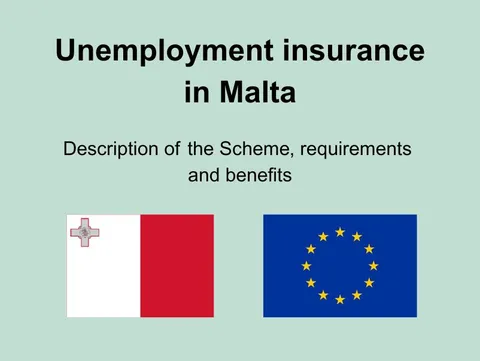EU
Malta
Unemployment
Insurance
Unemployment Insurance in EU->Malta
Unemployment insurance in Malta
This article deals with the benefits that people can claim if they lose their job. In fact, three benefits fall in this category:
- Unemployment Benefit (Benefiċċju għal Diżimpjieg)
- Special Unemployment Benefit (Benefiċċju Speċjali għal Diżimpjieg)
- Unemployment Assistance (Għajnuna għal-Diżimpjieg)
When can I make a benefit claim?
Unemployment Benefit is earnings-related and paid to any person losing their job. The eligibility criteria is a minimum of 50 weeks of contributions of which at least 20 must have been paid or credited during the 2-year period preceding the date of claim.
Special Unemployment Benefit (non-contributory scheme) is paid to the head of the household instead of the Unemployment Benefit, provided that the relative means test is satisfied.
Unemployment Assistance is paid at a rate that can change in accordance with the means test, and also in relation to the number of persons in the household.
How can I qualify?
The applicant must be registered as a full-time jobseeker with the Public Employment Services, and must be fit for and available for work, provided that the applicant has not yet reached the statutory retirement age. If the previous employment ended through no fault of their own, entitlement starts from the first day of unemployment; otherwise entitlement starts following a lapse of 6 months from the termination of employment.
What am I entitled to and how can I make my claim?
Daily rates for Unemployment Benefit:
- 60% of the basic weekly wage for the first 6 weeks (36 days) of benefit
- 55% of the basic weekly wage for the following 10 weeks (60 days) of benefit, and
- 50% of the basic weekly wage for the last 10 weeks (60 days) of benefit
The maximum amount is equivalent to 175% of the National Minimum Wage (Paga Minima Nazzjonali) whilst the lowest amount is pegged to the National Minimum Wage (Paga Minima Nazzjonali).
These payments are made from the first day of unemployment and continue for a period of 156 days. After that, the person concerned no longer qualifies for this benefit unless the person takes up employment again for a period of at least 13 weeks.
Unemployment Assistance is paid at a rate that can change according to the means test, and particularly according to the family composition. Unemployment Assistance amounts to a maximum of €133.89 per week for the head of household and varies according to the persons in the household.
Forms required for completion
A claimant must register as a jobseeker with the Public Employment Services by completing a Registration Form in person at one of their offices listed here.
Know your rights
Maltese Resources:
Who do you need to contact?
Department of Social Security
38, Ordnance Street
Valletta, VLT 1021
Malta
List of Social Security Hubs, here.
This page was last updated in 2024.
- Unemployment insurance in Europe →
Unemployment Insurance in Malta
You might also be interested in:
⇒EU social security coordination
⇒Unemployment Insurance in the Nordic countries
Key points of EU Unemployment Insurance coordination
- Transferring periods of work and insurance between EEA countries As an EU citizen you can transfer acquired rights from Unemployment Insurance when moving between EU/EEA contries. In this way it may be easier to become entitled to unemployment benefit in the country you move to.
In the vast majority of the Member states the aggregation rule become fully applicable as soon as you starts to work in the country. However in Denmark, Belgium and Finland you must work some period there before you can use the aggregation rule.
You need a PD U1 document in the country you leave or if the involved countries use electronically exhange (EESSI) there will be issued a SED U002. The countries who issues the highest number of PD U1 documents are Germany, Austria, Switzerland and the Netherlands. The countries who receives most PD U1 documents are Lithuania and Italy. - Transferring unemployment benefits Under certain conditions you can go to another EU country to look for work and continue to receive your unemployment benefits from the country where you became unemployed. The period you can export your unemployment benefits varies from 3 to 6 months in the different Member states.
You have to apply for a PD U2 document in the country you leave, or if you haven't done that the institution in the receiving country must request a SED U008 from the competent institution in your last country.
The countries who issues the highest number of PD U2 documents are Germany, Switzerland, the Netherlands and Denmark. Poland is the country who receives by far most PD U2 documents. - Unemployment benefits coverage According to OECD the net replacement of income after 2 months of unemployment, for a single person without children whose previous in-work earnings were 67% of the average wage varies from 33 percent (Ireland) to 91 percent (Belgium). Read more here..
- Having residence in another EU country than where you work? According to EU social security coordination rules you must only be insured against unemployment in one country at a time. As a generel rule this country is where you work.
In Member states who have compulsory insurance, you will automatically be covered when you start working there.
However you may be insured by your country of residence if you are posted to a EU/EEA country or work in two or more EU/EEA countries at a time. In these situations you can not your self decide where to have unemployment Insurance, but you (or your employer) must apply for a PD A1 document which states in which country you are covered by social security, including Unemployment Insurance. Special rule also apply for cross-border workers ("frontier workers"). - Third-country Nationals working in EU/EEANON-EEA citizens are covered by Unemployment Insurance in the EU countries who have compulsory Unemployment Insurance. In countries with voluntary Unemployment Insurance (Denmark, Sweden and Finland) third-country nationals can become member of an Unemployment Insurance Fund.
In the most countries Third-country nationals can also use the EU Coordination rules when moving within EU/EEA (however not in Denmark, Iceland, Liechtenstein, Norway and Switzerland).
Third-country nationals in short-tem working relations often faces problems with actually get Unemployment benefits, even though they have contributed to the system. This is due to the fact that one normally need a residence permit which allow one to take any job, and also because of a qualifying period in most countries between 6-12 months.

